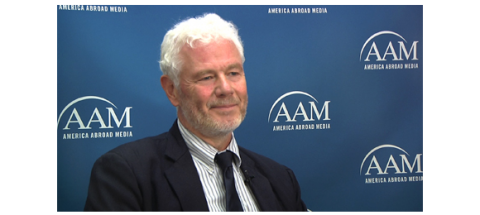Edward Girardet: Switzerland discriminates against English speakers
Switzerland needs to value the international community more, according to an opinion article written by veteran Swiss-American journalist Edward Girardet.
The provocative and strongly worded editorial piece, describing the Swiss government's neglect of English-language media as unwelcoming and discriminatory, was initially published on Monday by the Swissinfo website.
The article was subsequently removed within hours of being posted, after supposedly not meeting the publication standards of the government controlled public broadcast platform. (See below for full article)
Mr Girardet says that the decision to turn off World Radio Switzerland's FM transmitter in 2013 sent a disturbing if not nasty signal to the international community. He believes that English is the "official unofficial" fifth language in Switzerland and that more needs to be done to acknowledge it's vital role within the Swiss society.
Drivetime presenter, Tony Johnston, spoke with Edward Girardet about his controversial views and the desire to encourage robust discussion on the relevance of the English language in Switzerland.
Swiss-American Edward Girardet is a Geneva-based foreign correspondent and author and a specialist on war and humanitarian issues. He is also the editor of Le News.
Article:
When Bern refused last year to continue its support for World Radio Switzerland (WRS), the English-language radio station in Geneva run by the Swiss Broadcasting Corporation, it was sending a disturbing if not nasty signal to the region’s approximately 200,000-strong international community, including many Swiss who enjoyed its different perspective.
The decision basically said: “We’ll take what you have to give us, but we really don’t care about you.”
This narrow-minded if not discriminatory approach was further reinforced by the refusal of the Federal Office of Communications to allow Anglomedia, the new owners of WRS, to continue on FM, which is what most people listen to. It insisted that the station go straight to DAB+, itself an already outdated White Elephant costing taxpayers millions of francs that is being superseded by internet, mobile phones and satellite broadcasting. In contrast, other Swiss stations have been allowed to retain their FM wavelengths. Compared to its previous audience, estimated at around 100,000, including listeners on the French side of the border, the new WRS currently only attracts just over 32,000 listeners a day across Switzerland because most do not have DAB+.
My own newspaper, Le News, a free English-language print and electronic publication for the Lake Geneva region, reaches some 45,000 regular readers, notably Europeans, Americans, Canadians, Australians, Russians, Africans and Arabs, plus Swiss with cosmopolitan or mixed marriage backgrounds. Launched just over a year ago, Le News has established itself as a vital source of local and regional information about Switzerland. swissinfo.ch, an excellent online news service partly funded by the government, also reaches some of these foreigners, but is not widely viewed as a local community voice.
The importance of English-language media in Switzerland is to ensure that the numerous (1.7 million is a figure often used) first and second-language English speakers, whether Swiss or foreign, understand what is happening in our country. The other is to provide a form of insight not necessarily reflected in mainstream Swiss media. While many ‘internationals’ speak at least some French, German or Italian, a sizeable number do not. Furthermore, many are only here for two or three years and fail to integrate. The end result is that most do not rely on Swiss newspapers or radio and TV stations for their information.
As a community, however, these outsiders represent highly influential businesses and international organizations, whether Procter & Gamble, Caterpillar or the World Intellectual Property Organization (WIPO), that are crucial to Switzerland’s economic well-being. After all, without its foreigners, who contribute vital taxes, jobs, investment and expertise, the Swiss economy would collapse. The bulk of its key industries and services, such as pharma, high-tech, watch-making, tourism, hotels, restaurants, farming, finance and education, cannot survive without migrant skills.
And we are not talking only about ‘frontaliers’ – or cross-border workers – from France or Germany, but directors, managers, researchers and technicians from places like the United States, India and Argentina. Many of Switzerland’s leading corporations, such as Nestlé, Novartis and ABB, have foreigners in their upper echelons. These companies do not seek nationalities; they seek the best people possible, regardless of origin, in order to operate in a highly competitive global arena.
Despite being here for years and making important contributions to Swiss society, numerous migrants feel ostracized. Part of this is their own fault. Many make little effort to learn more than basic French or German because they are only here for short stints or function in primarily English-speaking environments, such as the United Nations. Or because they fear the challenge of a new language. Others simply have not got the time.
But we Swiss are also to blame. Apart from some cantons and individual communes, Switzerland makes very little effort to accommodate its foreign population, or to help them understand Swiss society. Also, as condoned by political parties, such as the Swiss People’s Party, it is socially acceptable to regard foreigners, including those who have since become naturalised citizens, as ‘others’. Such prejudice is not only unacceptable, but xenophobic.
As a “world Swiss” (Weltschweizer), born in the United States of Swiss parents (father from Vaud, mother from Basel), what I am perceiving is a Switzerland that takes rather than shares, or worse, fails to acknowledge its foreign community. Many Swiss, even if they are benefitting heavily from outsiders as customers for their businesses, such as supermarkets, restaurants or golf clubs, like to complain that Switzerland is no longer Swiss. Not unlike self-righteous rightwing American patriots, they justify this by maintaining that foreigners should consider themselves privileged to be living in such a beautiful country. Of course, they are right, but it is a privilege for all of us.
The end result is that we come off as a shamelessly selfish people, unable to grasp the importance of what these migrants are providing. Many Swiss do not like to hear this, but it is a reality that we need to deal with. Nor do they, including certain leading newspapers, wish to debate it. Last February’s vote on limiting immigration clearly has not helped, even if the overwhelming rejection of the November 30 Ecopop vote somewhat redeemed the Swiss in the eyes of many internationals. New anti-foreign initiatives, however, are in already in the offing.
Foreigners are feeling increasingly unwelcome. With international companies picking up and leaving, growing numbers of potential migrants, many of them precisely the sort of people we need, are thinking twice about relocating to Switzerland. Such trends are deeply worrying for Swiss enterprises, which rely heavily on highly qualified foreign labour. All this is exceptionally shoddy public relations and doing little for Switzerland’s reputation.
While most informed Swiss, particularly in the more international parts such as Geneva, Zurich or Basel, know this only too well, there are numerous citizens who fail to recognize this. And yet, with their votes, they are holding Switzerland’s future hostage. They remind me of those conservative Pushtun tribesmen I used to meet while covering the war in Afghanistan as a journalist. They resent any form of outside thinking or change, believing that they can continue living in a past that no longer exists. Not only do such attitudes severely threaten the Swiss economy, but they are uncomfortably reminiscent of those disgraceful ‘Gastarbeiter’ years of the 1950s, 60s and 70s, when we allowed Italians, Portuguese and Spanish to come and work, but not with their families. And when we no longer needed them, we tossed them out.
Fortunately, the Swiss are an extremely pragmatic people when up against the wire, much of it thanks to migrant influences. They recognize the numerous positive aspects that make this country such a unique place, and why it is critical not to lose our international advantage.
For one, Switzerland is a far more dynamic, diverse and imaginative society than 40 years ago, when, quite frankly, it was a beautiful but dreadfully boring place. While attitudes have not necessarily changed, the country has emerged as a far livelier and more creative nation, particularly for young people. It is a Switzerland of the future with ground-breaking ideas and initiatives. One only need consider how the EPFL in Lausanne has risen from a largely unknown entity less than a decade ago to one that rivals Boston’s MIT worldwide, or Geneva’s Graduate Institute, a firm player in the international arena for political and environmental trends. Or ArtBasel, the world’s leading art hub, in a city which founded Switzerland’s first university in 1460 and has since played a critical global role as a “thinking” hub.
Switzerland is also a healthier, more open society. Until the 1980s, any black or Asian person was assumed to be either a student or a foreign diplomat. Now, you have Swiss of Tibetan, Vietnamese, Ugandan, Salvadoran or Sri Lankan background. And, as far as the young men are concerned, many will have served in the Swiss army. While before there were no more than two or three Chinese and Indian restaurants in most large towns, today one can find ethnic cuisine almost anywhere in Switzerland, even in small country villages in Graubünden and the Wallis.
Swiss often forget that for much of their own history is immigrant-based. Two thousand years ago, Roman towns ranging from Emperor Augustus and Avenches to Nyons, were thriving cosmopolitan centres for commerce and culture, a veritable European Union. Today, Switzerland has become once again a vibrant immigrant society. The challenge now is to accept that in order to excel with a forward-thinking, razor-edge economy, Switzerland needs to become more European given that EU is our biggest trading partner. It also needs to embrace quality immigration as a basis for its continued survival.
But for this to happen, we need to stop sending out derogatory messaging, whether the slashing of fiscal incentives or the imposing of immigrant quotas. While this may delight the populist right-wingers, they may think twice once the economy starts stagnating. Even those hinterland cantons, which have supported immigration restrictions, but rely heavily on tourism, will suffer from lack of investment or the ability to find qualified cooks and waiters. Even tourists are beginning to sense Switzerland’s rather sour anti-foreign rhetoric.
Given the ever-widening cultural and linguistic gaps of the Röstigraben (the linguistic divide between German and French in Switzerland) and Polentagraben (the crevice between Italian-speaking Ticino and the rest of Switzerland) is a far less a homogenous nation today as it splits more and more into three separate entities. The Swiss French are far more isolated from the German-speaking north than ever before. Travelling to Schaffhausen or Lucerne from Lausanne is like visiting another country. It is even worse for Ticino. This has little to do with immigration. It is more a question of Switzerland’s own 21st century identity crisis.
Perhaps the biggest irony, however, is that English is becoming an increasingly important cross-community, even unifying language. After all, key meetings at the ICRC in Geneva or Swiss banks in Basel and Zurich are being held in English. Growing numbers of young Swiss professionals are turning to English-language media such as the BBC, Al Jazeera or International New York Times as their principal secondary news sources. In the rapprochement with Switzerland’s foreign community, this is where entities such as WRS and Le News can play key roles. Not just by providing internationals with a better understanding of Swiss society, but by offering English-speaking Swiss a much-needed alternative perspective.
The article was originally posted on WRS https://worldradio.ch/news/
Send your comments to info@executives-int.ch







